While the GOP try to fend off a blue wave at the polls on Tuesday, a contentious D.C. Council race may cause a spike in voter turnout, despite the District’s lack of representation in Congress.
Nearly twice as many voters cast early ballots in the 2018 Washington midterm elections as in 2014, according to the D.C. Board of Elections, signaling a possible change in the city’s historically low voter turnout.
The surge in early voting demonstrates an uptick in voter enthusiasm in the District after a particularly poor showing in the June primaries when just 18 percent of registered voters cast ballots, the lowest turnout in a mayoral primary since 2010.
Voter turnout in the District has long suffered in midterm elections, in part because Washington doesn’t have full representation in Congress. But this year could be different said Charles Wilson, chair of D.C. Democrats.
“There’s a hot race,” Wilson said. “In the at-large race you have more candidates that are driving up interest.”
A race worth watching
Two at-large D.C. Council seats are up for grabs Tuesday, one of which is reserved for a candidate not from the majority Democratic party. Incumbent Councilmember Anita Bonds, D-At Large, is expected to retain her seat while independent incumbent Councilmember Elissa Silverman is facing a serious challenge from Dionne Reeder. Reeder is running as an independent and is a restaurant owner with ties to the District’s business community.
A paid family leave law, which Silverman co-wrote with D.C. Council Chairman Phil Mendelson and is set to take effect in July 2020, has been at the center of the race between the two independents.

Reeder criticized the law because it requires employers to finance paid family leave for District workers — both District residents and commuters — with a 0.62 percent payroll tax. Silverman defended the bill saying that federal law forbids District government from levying an income tax on non-District residents. If Washington were a state, Silverman said, the law could be structured differently. Mayor Muriel Bowser has also spoken negatively about Silverman’s paid family leave program.
Reeder announced her candidacy in October 2017 and has garnered this significant increase in popular and financial support after Bowser endorsed her in September of this year. Bowser and the business community initially backed candidate S. Kathryn Allen before she was tossed off the ballot in September for collecting fake signatures in her candidate petition.
Silverman and Reeder are working to restore residents’ faith that District government is working for them. Both candidates say D.C. voters have lost faith in their elected officials. Wards 7 and 8, the poorest wards in the city experienced low voter turnout in the primary, with only 12.5 percent and 8.3 percent of eligible voters turning up, according to the D.C. Board of Elections.

“I think a lot of District voters feel like they don’t have a reason to vote,” Silverman said. “I think it also shows that Ward 7 and 8 voters don’t feel like District government is working for them and they don’t think their vote matters.”
Reeder attributes low turnout to a disconnect between residents and their elected officials. She said councilmembers need to “spend [their] time not so much focused on what’s happening inside the Wilson Building,” D.C.’s City Hall, but instead, “get out into the community and listen to the residents.”
Competition, personalities drive turnout
Voter turnout reached nearly 50 percent in Marion Barry’s final primary election as a candidate for mayor in 1994. There was high voter enthusiasm that year as Washington’s “Mayor for Life” faced a strong challenge from then-Councilmember John Ray.
“Marion Barry was a hero-like figure to a lot of people and a villain to some, so he was a candidate who got people interested in the election,” Wilson said. “And he had a viable opponent.”
Voter turnout in mayoral primaries has been trending downward since 1994, but Wilson said unique circumstances drove this year’s especially low rate.
“There wasn’t a whole lot of competition on the ballot,” Wilson said. “A lot of times it’s competition between candidates that drives up interest in local elections.”
Bowser won 80 percent of the vote and six incumbent councilmembers won their nominations comfortably.
Initiative 77, the referendum on raising the minimum wage for tipped workers, was the most contentious measure on the ballot, with District voters narrowly approving the pay raise. But opponents of the initiative pointed to the primary’s 18 percent turnout as a way to discredit the vote and argued the referendum should be held during a general election when independent voters are more likely to vote. The D.C. Council has since overturned the initiative.
The referendum on legalizing marijuana and a competitive mayoral race between Bowser and independent David Catania in 2014 helped inspire the highest turnout in a midterm general election in two decades. Washingtonians voted overwhelmingly to legalize marijuana.
Partisan primaries
Washington, D.C., and 14 states hold closed primary elections, in which voters must register with a party and can only vote in that party’s primary.
“When you have a city that’s three-quarters Democratic, the Democratic primary is the ultimate decider,” Silverman said. “We should explore whether primaries are a way that suppresses voter turnout.”
Silverman favors an open primary system in which candidates have no party affiliation. The top candidates would then compete in a runoff election, Silverman said. Reeder had no comment on the format of primary elections.
Independents make up 17 percent of registered voters in Washington, but most don’t vote in primaries because they are not eligible to vote across party lines. In the June primary, independents could vote in the tipped-wage referendum but were restricted from voting for any candidates.
Chair of D.C. Democrats Charles Wilson said Democrats believes in certain topics that separate them from Republicans and independents.
“We only want Democrats to weigh in on those issues,” Wilson said. “If somebody wants to weigh in on those issues, they can simply just become Democrats.”
A bid for statehood
Affordable housing, community services and the divide between District residents and their elected officials are among the many issues driving voters to the polls this election, said Max Sycamore. His husband, Jamie Sycamore, is running for the D.C. Council Ward 1 seat.
Max Sycamore said voters seem more motivated ever since the results of the 2016 election.
Kathy Chiron, president of the League of Women Voters of the District of Columbia, isn’t sure D.C. voters feel that voting in local races adds to the national discussion. Chiron said that, unless a local race affects voters directly, many in the electorate won’t get involved and won’t understand what’s at stake.
Chiron said the issue of statehood would motivate voters. She said there’s “no doubt” in her mind that having direct representation in Congress, as well as voting power, would increase voter turnout in the city.
Ward 3 voter Alexandra Tucci moved to the District from Georgia a year ago. She said the national climate compelled her vote, but wishes her vote held more weight, saying “it’s not like my vote will affect the Georgia election, or any Senate or House races.”
Rebecca Kukla, another local voter, echoed Tucci’s dissatisfaction. She called for statehood, describing this election “existentially frustrating.”
“The whole country seems to be working towards change,” Kukla said. “Yet us and Puerto Rico don’t get a voice in that conversation.”




Add comment